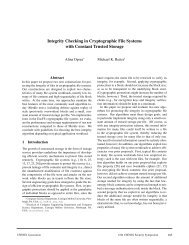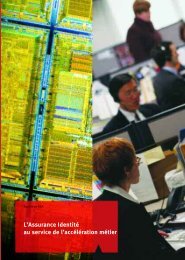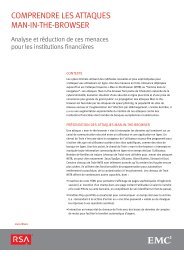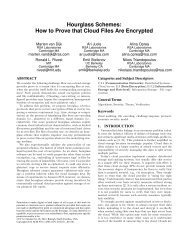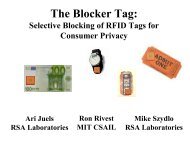Governance of Enterprise Security: CyLab 2012 Report How ... - RSA
Governance of Enterprise Security: CyLab 2012 Report How ... - RSA
Governance of Enterprise Security: CyLab 2012 Report How ... - RSA
Create successful ePaper yourself
Turn your PDF publications into a flip-book with our unique Google optimized e-Paper software.
establishing key positions for privacy and security and appropriately assigning responsibilities. Less than two-<br />
establishing key positions for privacy and security and appropriately assigning responsibilities. Less than twothirds<br />
<strong>of</strong> the Forbes Global 2000 companies responding to the survey have full-time personnel in key roles for privacy and security<br />
thirds <strong>of</strong> the Forbes Global 2000 companies responding to the survey have full-time personnel in key roles for privacy and security<br />
(CISO/CSO, CPO, CRO) in a manner that is consistent with internationally accepted best practices and standards. An<br />
(CISO/CSO, CPO, CRO) in a manner that is consistent with internationally accepted best practices and standards. An<br />
amazing 82% <strong>of</strong> the respondents indicated that they did not have a CPO. In addition, the majority <strong>of</strong> CISOs<br />
amazing 82% <strong>of</strong> the respondents indicated that they did not have a CPO. In addition, the majority <strong>of</strong> CISOs<br />
(58%) and 47% <strong>of</strong> CSOs are assigned responsibility for both privacy and security and tend to report to the<br />
(58%) and 47% <strong>of</strong> CSOs are assigned responsibility for both privacy and security and tend to report to the<br />
CIO, creating segregation <strong>of</strong> duties (SOD) issues that are against best practices.<br />
CIO, creating segregation <strong>of</strong> duties (SOD) issues that are against best practices.<br />
Despite these organizational improvements, respondents indicated that Audit Committees and full boards are<br />
Despite these organizational improvements, respondents indicated that Audit Committees and full boards are<br />
still mostly responsible for oversight <strong>of</strong> risk. The report highlights the SOD issues that arise when Audit<br />
still mostly responsible for oversight <strong>of</strong> risk. The report highlights the SOD issues that arise when Audit<br />
Committees both oversee the development <strong>of</strong> security programs and also audit the controls and effectiveness<br />
Committees both oversee the development <strong>of</strong> security programs and also audit the controls and effectiveness<br />
<strong>of</strong> such programs.<br />
<strong>of</strong> such programs.<br />
Although most boards (89%) review risk assessments, less than half <strong>of</strong> them hire outside expertise to assist<br />
Although most boards (89%) review risk assessments, less than half <strong>of</strong> them hire outside expertise to assist<br />
with risk management. Only 16% <strong>of</strong> board Risk Committees and 16% <strong>of</strong> IT Committees hire outside<br />
with risk management. Only 16% <strong>of</strong> board Risk Committees and 16% <strong>of</strong> IT Committees hire outside<br />
experts. Despite 91% <strong>of</strong> the respondents indicating that risk management was being actively addressed by the<br />
experts. Despite 91% <strong>of</strong> the respondents indicating that risk management was being actively addressed by the<br />
board, the issues that received the least attention were IT operations (29%), computer and information<br />
board, the issues that received the least attention were IT operations (29%), computer and information<br />
security (33%), and vendor management (13%). The continuing low scores in these areas indicate that boards<br />
security (33%), and vendor management (13%). The continuing low scores in these areas indicate that boards<br />
do not understand that, today, all business operations are supported by computer systems and digital data,<br />
do not understand that, today, all business operations are supported by computer systems and digital data,<br />
and that risks in these areas can undermine operations. The low response for vendor management is<br />
and that risks in these areas can undermine operations. The low response for vendor management is<br />
concerning because it indicates that the privacy and security <strong>of</strong> data at cloud and s<strong>of</strong>tware providers and<br />
concerning because it indicates that the privacy and security <strong>of</strong> data at cloud and s<strong>of</strong>tware providers and<br />
outsource vendors are receiving little oversight.<br />
outsource vendors are receiving little oversight.<br />
Another positive sign from the survey was the importance that boards are placing “Another positive<br />
Another positive sign from the survey was the importance that boards are placing “Another positive<br />
upon IT and security/risk expertise in board recruitment. Results indicated that IT sign from the survey<br />
upon IT and security/risk expertise in board recruitment. Results indicated that IT sign from the survey<br />
expertise was very important or important for 37% <strong>of</strong> the respondents and somewhat<br />
expertise was very important or important for 37% <strong>of</strong> the respondents and somewhat was the importance<br />
important for 42%. Risk and security expertise was even more encouraging, with 64% was the importance<br />
important for 42%. Risk and security expertise was even more encouraging, with 64% that boards are<br />
<strong>of</strong> the respondents indicating that it was very important or important and 27% that boards are<br />
<strong>of</strong> the respondents indicating that it was very important or important and 27%<br />
indicating it was somewhat important.<br />
placing upon IT and<br />
indicating it was somewhat important.<br />
placing upon IT and<br />
security/risk<br />
security/risk<br />
INDUSTRY SECTOR COMPARISONS<br />
INDUSTRY SECTOR COMPARISONS<br />
expertise in board<br />
expertise in board<br />
recruitment.”<br />
Industry sector and regional comparisons from the survey provide interesting insights into recruitment.”<br />
how privacy and<br />
Industry sector and regional comparisons from the survey provide interesting insights into how privacy and<br />
security risks are managed among critical infrastructure industry sectors and across geographical regions. The<br />
security risks are managed among critical infrastructure industry sectors and across geographical regions. The<br />
survey confirmed the belief among security experts that, overall, the financial sector has better privacy and security practices than<br />
survey confirmed the belief among security experts that, overall, the financial sector has better privacy and security practices than<br />
other industry sectors. Respondents indicated that the financial sector paid more attention to IT and security<br />
other industry sectors. Respondents indicated that the financial sector paid more attention to IT and security<br />
issues and was more engaged in best practice activities, such as budget reviews, roles and responsibilities, and<br />
issues and was more engaged in best practice activities, such as budget reviews, roles and responsibilities, and<br />
top-level policies, than the energy/utilities, IT/telecom, and industrials industry sectors. The financial sector<br />
top-level policies, than the energy/utilities, IT/telecom, and industrials industry sectors. The financial sector<br />
also has a higher rate <strong>of</strong> (1) board IT/Technology Committees, and (2) Risk Committees separate from the<br />
also has a higher rate <strong>of</strong> (1) board IT/Technology Committees, and (2) Risk Committees separate from the<br />
Audit Committee that have responsibility for privacy and security.<br />
Audit Committee that have responsibility for privacy and security.<br />
The IT/telecom sector tends not to establish board IT/Technology Committees and assigns privacy and<br />
The IT/telecom sector tends not to establish board IT/Technology Committees and assigns privacy and<br />
security oversight responsibilities to their Audit Committees. The energy/utilities and industrials sector<br />
security oversight responsibilities to their Audit Committees. The energy/utilities and industrials sector<br />
respondents each indicated that their boards never (0%) address vendor management issues, whereas the<br />
respondents each indicated that their boards never (0%) address vendor management issues, whereas the<br />
financial and IT/telecom respondents said they do (28% and 15%, respectively). Energy/utilities<br />
financial and IT/telecom respondents said they do (28% and 15%, respectively). Energy/utilities<br />
respondents also ranked the lowest in establishing board Risk Committees separate from the Audit<br />
respondents also ranked the lowest in establishing board Risk Committees separate from the Audit<br />
Carnegie Mellon <strong>CyLab</strong><br />
Carnegie Mellon <strong>CyLab</strong><br />
!<br />
R!<br />
R!



